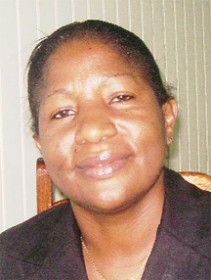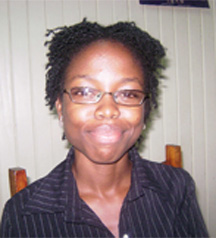-seen as fraction of real figure
Child abuse reports totalled 1015 for the first quarter this year but that number is seen as just a fraction of the real figure, according to the Childcare and Protection Agency (CPA)

It argued that to effectively tackle this issue, communities need to get onboard and start identifying vulnerable victims. The 1015 figure for January to March is around the tally for the whole of last year.
The Agency’s Deputy Director of Operations, Diana Swan-Lawrence during an interview released some of the findings of the quarterly report (from January to March 2010). The report provided stats on cases involving sexual, physical and verbal abuse along with those where children were abandoned and neglected. She told Stabroek News that the cases recorded for this period represent both sexes up to 16 years.
Of the 1015, 20% were physically abused, 15% sexually abused, 9.4% verbally abused, 50% were cases of neglect and 2.9% were of child abandonment.
Lawrence noted that in 88% of the cases, close relatives were living in the same home with the abused while in the others the perpetrators are listed as either other persons or unknown.
The report notes that 27% of the abused children were between the ages of 3 years 9 months and 11 or 12 years old while 19% were at secondary level.

Since the establishment of the child abuse hotline, the Agency has seen an upsurge in reports. Reports are also made on the office number.
“I must hasten to say that there has been an increase in child abuse reports. People seem to be more confident” Lawrence told this newspaper.
According to the quarterly report, out of cases reported in Region Four 55% turned out to be abuse; in Region Six, 21%; in Region Three, 10%; in Region 10, 4.2% and in Region One, 0.8%.
The Deputy Director later explained that there are Probation and Social Services Officers in the other regions who are dealing with reports there and this is the reason behind the figures not being reflected in the quarterly report. She stressed however that there are cases occurring in these unmentioned regions.
The Probation and Social Services Officers who are present in all ten administrative regions fall under the Ministry of Human Services and Social Security while the Agency has Child Protection Officers who are present in Regions Three, Four, Six and Ten.
According to Lawrence, the Agency is working to have child protection officers in all the regions.
“They have been working and because we are not fully staffed, we will certainly be working together with the probation officers” she noted.
Empowerment
programmes
Lawrence told this newspaper that the Agency sees a need to start empowerment programmes targeting adolescent girls who represent the highest figure in sexual abuse cases.
She said that while this initiative is still in the planning stages, officers in the meantime are targeting schools. The campaign will focus on both sexes but in explaining why the females were most vulnerable, Lawrence said that figures for last year reflected that 96% of sexual abuse cases were against adolescent girls.
She recalled that during last week, she held a talk with some orphans and vulnerable children at a Non-Governmental Organisation (NGO) about their rights as children and what is an inappropriate touch. She expressed hope that with such ventures, child abuse cases will decrease.
“We are looking at the children who are more deprived, that are poorer, that are from dysfunctional homes. Those children suffer sexual, physical, verbal abuse and so on, and they are still not sent to school. So we are actually working with and are looking at empowerment programmes for unmarried females and males before they actually get into marriage”, Lawrence explained. She said the plan is to target in particular those young women who have just left school but these ideas are still fresh.
“We are still in the planning stages because we know there is a great need out there … But we think that this is very necessary … raising children is so much more important”, she noted.
She added that the Agency recently got a monitoring and evaluating officer and now that the stats will be coming in, there will be information to work with and as times passes programmes will be developed to tackle some of the issues.
Officers of the agency recently travelled to Berbice and Linden to sensitive the public on child protection and the Agency’s role.
Tip of the iceberg
Head of the Agency Ann Greene told this newspaper that her staff are working hard to deal with cases that are reported but staff shortages will always be a problem because of the rise in cases.
She said that Agency was presently in the process of hiring but she stressed that the biggest challenge is finding persons who are willing to go the extra mile.
“This is not just a job that you can come and work for money… This is a job that requires a high level of commitment. At the care centre we need people to care for children, vulnerable children”, she added.
She noted that when it comes to children “you got to feel it because children are suffering outside there. What we are dealing with now is just the tip of the iceberg”.
She told this newspaper there is a lot of hidden cases of abuse and in many instances the victims are at the age where they cannot speak.
According to Greene engaging the community to assist in identifying child abuse is a major challenge and there are cases where the community is the abuser.
She pleaded with the community to be the Agency’s “eyes and ears”.
“A lot of things with children could be helped if the community is vigilant, if it is a caring community…The children are the leaders for tomorrow, they are the human resources to develop a country. We got to take care of our children and every member of the community should see it as their responsibility to protect a child. Child protection is everyone’s business”, Greene stressed.
She noted that in almost every family there is a situation that needs the intervention of a counsellor or a social worker adding that the community could help in a big way to identify these situations and curb this practice.
She said that while persons may report cases to the Agency, there cannot always be an immediate response. She urged persons to keep calling (the agency) until action is taken.
Greene told Stabroek News that there are many instances where officers walk into hostile environments, sometimes being threatened and that is why most often they are accompanied by the police.
She said that people sometimes get the idea that the Agency wants to take away their child or children but this is far from the truth. The objective is to make a decision in the best interest of the child and not to let that be based on emotions.
“It is also our policy that a child should return to the family. The ultimate goal when we take them is for the child to be returned to their biological families but to do that it means that we have to work with the families” she said, adding that it is easier to fix the child than the family.
In fixing the family, officers would work with the parents to improve their parenting skills and in the case of the child provide counselling to help them overcome their traumatic experience.
“We want to prevent the abuse or even stop it from continuing. We don’t want to take a child away. Removing a child from the home is the last resort. That is the policy that is what we operate on”, Greene said.
Stabroek News was told of a situation in the city where children are growing up to beg on the streets. According to the CPA head, all the child knows is begging but the Agency can provide assistance to the child and parent(s).
“People get in their head this begging syndrome, but the parents can come to get money to take care of the children”, she said but noted that these parents will not come forward to benefit from single parent programmes which have been established.
Greene told Stabroek News of a case where a young woman was brought up in a life of begging. Through valiant efforts however, officers of the Agency were able to reform her and are now seeking a job for her.
Foster care
The CPA runs three child care centres – the Sophia Centre, the drop-in centre at Hadfield Street and the Mahaica Children’s home. About 150 children occupy these centres but the numbers rise daily. At these homes, the agency looks after the meals, clothing, educational and counselling needs of the children.
According to Teresa Gaime, the Deputy Director, Children Services Develop-ment, sending these vulnerable children to these residential homes is the last resort. She explained that if the child is at risk of harm, the Agency has to take the child out of that situation by either placing him/her with relatives or enrolling in the foster care programme.
Gaime urged persons to come out and joint this drive stressing that it is not adoption and there will be financial and other forms of support from the ministry.
She explained that it is an agreement to temporarily care for the child and there is a process where the Agency reviews the fostering arrangement periodically,
She noted that not enough persons are coming forward and presently there are 42 persons in the programme. She later explained that interested persons have to go there for a very simple screening process and declared that fostering a child “is really a rewarding thing”.
The ages of the children in the programme range from birth to 18-years-old but there are situations “where they reach the age (18) but we don’t put them out”, Gaime said explaining that the Agency is currently working on establishing a halfway home for those children who are aging out of the system.
The CPA was officially established in 2009 but was in operation since 2006.
According to Gaime, the Agency also monitors the operations of 20 children’s homes in addition to the three she had earlier mentioned. This is done with the help of a handbook which sets out the operations standards that would ensure the safety and well-being of the children.
Anyone desirous of reporting any cases of abuse to the Agency can call the 24-hour hotline number – 227 0979 or visit the office which is located in the Ministry of Human Services and Social Security building. Abused or neglected children could be taken to the Drop-in centre.





